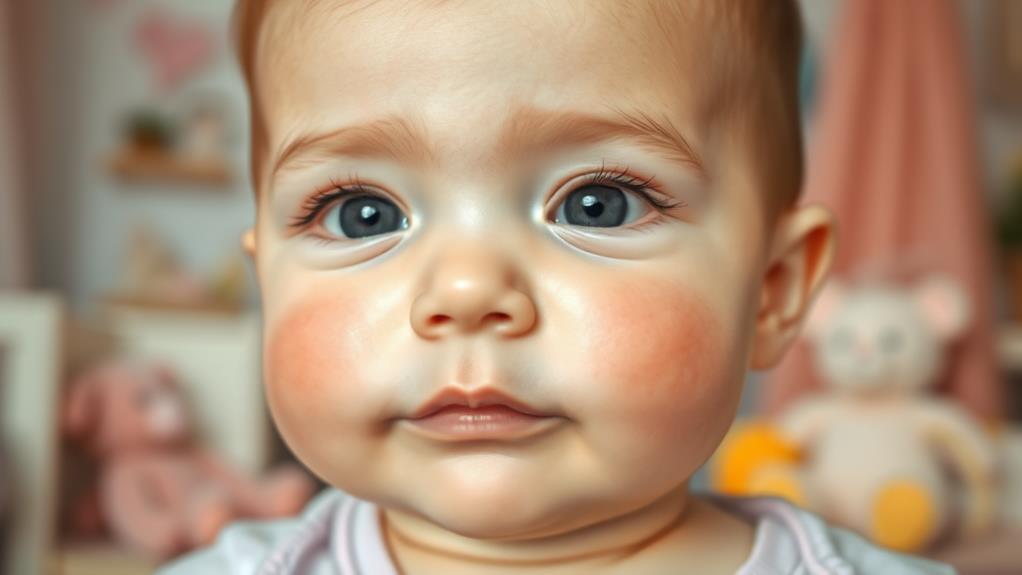If you've noticed small red or white bumps on your baby's face, you might be wondering whether it's something to worry about. Infant acne, while common and typically harmless, can leave many parents feeling uncertain. Understanding its causes and symptoms is essential, as is knowing how to manage it effectively. You may think that a gentle touch is all it takes, yet there are important considerations and practices that can make a difference. So, what should you really know to ensure your baby's skin remains healthy and clear?
What Is Infant Acne?
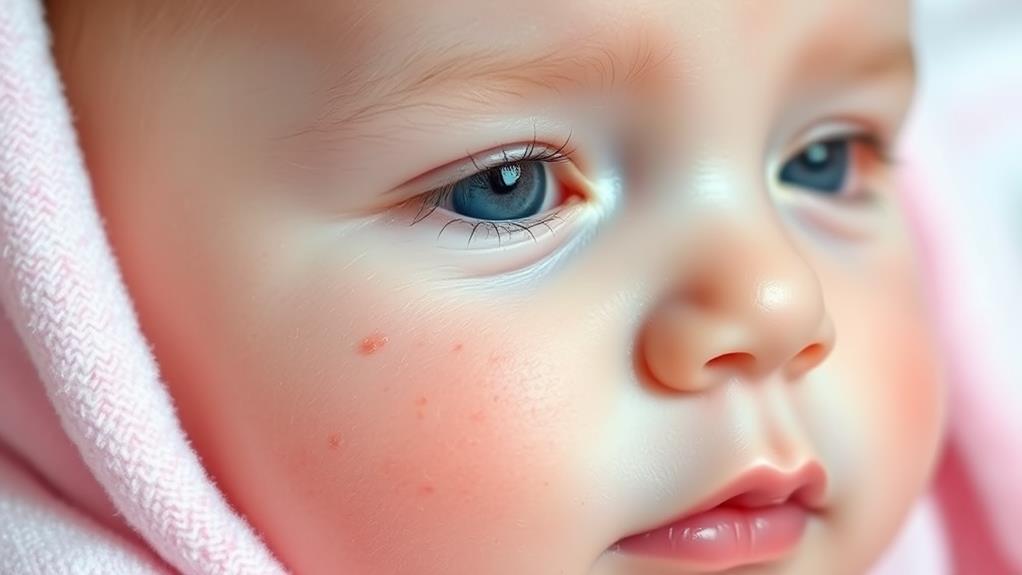
Infant acne, often appearing as small red or white bumps on a baby's face, is a common condition that can surprise new parents. It typically shows up on the cheeks, forehead, and chin, making your little one's delicate skin look a bit different from what you might expect.
While it might seem concerning, you should know that infant acne is usually harmless and often clears up on its own within a few weeks or months.
This condition occurs due to hormonal changes that happen during pregnancy and shortly after birth. Your baby's skin is still adjusting to life outside the womb, and these hormonal fluctuations can lead to clogged pores.
You may notice that the bumps can sometimes worsen with heat or when your baby's skin gets irritated.
It's important to remember that infant acne isn't caused by poor hygiene or anything you've done wrong as a parent. Instead, it's a natural phase in your baby's development.
Keeping your baby's skin clean and avoiding heavy creams can help, but most importantly, you should stay calm and patient as it usually resolves itself without any treatment.
Causes of Infant Acne
Several factors contribute to the development of infant acne. One of the main causes is the presence of maternal hormones in your baby's system. These hormones can stimulate the oil glands in their skin, leading to breakouts. This typically happens in the first few weeks after birth and is often temporary.
Another factor is the skin's natural oils. Infants have delicate skin, and sometimes their oil production can go into overdrive, causing clogged pores.
Additionally, it's important to consider that certain products you use, like lotions or creams, might irritate your baby's skin and contribute to acne.
Environmental factors, such as heat and humidity, can also play a role. When your little one is too warm or sweating, it can worsen any breakouts.
Lastly, friction from items like blankets or even your clothing can lead to irritation and potential acne development.
It's essential to keep your baby's skin clean and avoid heavy products that could contribute to the problem. Understanding these causes can help you feel more in control as you navigate this common issue with your infant.
Symptoms to Look For
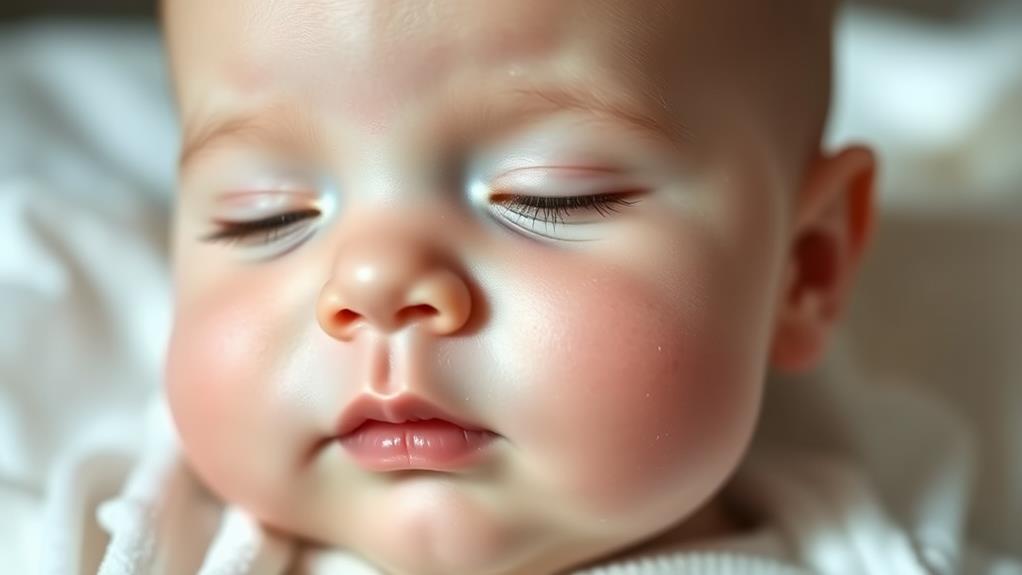
When observing your baby's skin, look for a few telltale signs of acne. You might notice small red bumps or pimples on their cheeks, forehead, or chin. These can vary in size and may sometimes appear inflamed.
Your baby's skin may also have tiny whiteheads, which can be mistaken for milk spots. These whiteheads are usually harmless and often clear up on their own.
Another symptom to watch for is the presence of pustules, which are small, pus-filled bumps. While they can seem alarming, remember that infant acne usually doesn't cause discomfort or pain to your little one.
It's important to keep an eye on the duration of these symptoms. If the acne persists for several weeks or worsens, it might be worth consulting your pediatrician.
Lastly, be mindful of any crusty patches or dry skin around the affected areas. While this mightn't be a direct symptom of acne, it can indicate irritation or sensitivity that may require gentle attention.
Risk Factors Involved
Understanding your baby's unique skin can help identify the risk factors associated with infant acne. One significant factor is hormonal changes, which may occur during pregnancy. These hormones can transfer to your baby, potentially leading to breakouts after birth.
Another risk factor is age; most infants develop acne between two weeks and six months.
Skin type also plays a role. Babies with oily skin might be more prone to acne, as excess oil can clog pores. Environmental factors, like heat and humidity, can worsen the condition too. If your baby sweats a lot, especially in warm weather, this can contribute to acne flare-ups.
Additionally, genetics can be a factor. If you or your partner experienced infant acne, your baby might be more likely to develop it as well.
Lastly, certain products, such as lotions or oils, can irritate your baby's skin and trigger acne.
Diagnosis by Healthcare Professionals
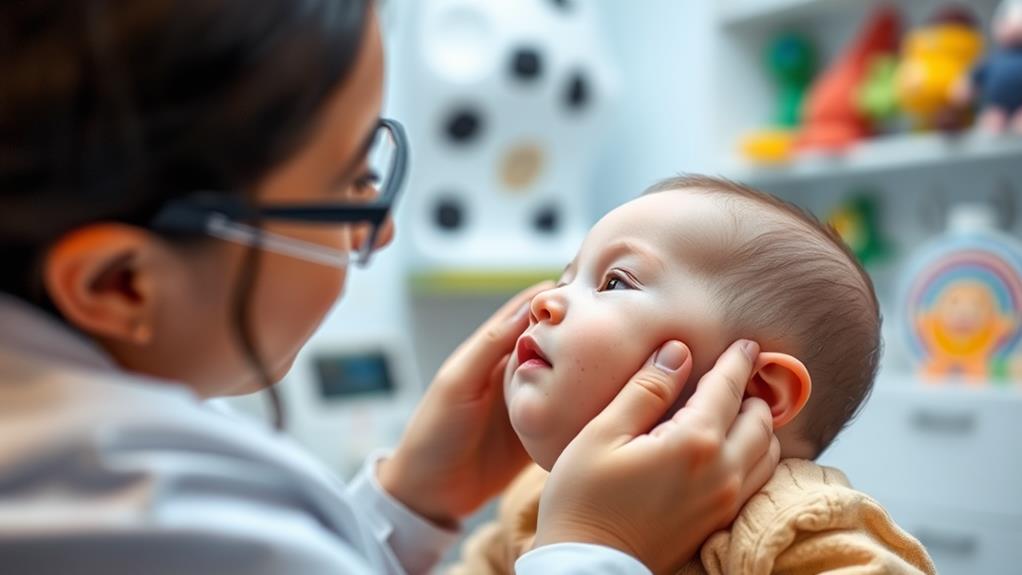
Recognizing the signs of infant acne is the first step, but a proper diagnosis by healthcare professionals is key for reassurance and appropriate care. When you notice small, red bumps on your baby's face, it's understandable to feel concerned.
Scheduling a visit with your pediatrician can help you confirm whether it's indeed infant acne or something else, like eczema or a rash.
During your appointment, your healthcare provider will carefully examine your baby's skin. They'll ask about your baby's overall health, any recent changes in routine, and whether there's a family history of skin conditions. This information is crucial for a thorough understanding and accurate diagnosis.
Once diagnosed, your healthcare provider can guide you on the best course of action. They'll explain that infant acne is usually harmless and often resolves on its own.
However, if the condition worsens or doesn't improve, they may recommend further evaluation. Remember, having a professional assess your baby's skin not only provides clarity but also eases your worries.
Home Remedies for Treatment
Many parents seek home remedies for treating infant acne, hoping to soothe their baby's skin naturally. One effective approach is to keep your baby's skin clean and dry. Gently wash their face once a day with lukewarm water and a mild, fragrance-free baby soap.
Avoid scrubbing, as this can irritate the skin and worsen the acne.
Another option is to apply a small amount of aloe vera gel. Aloe vera has soothing properties that can help reduce inflammation and redness. Just make sure to use pure aloe vera without added chemicals.
You could also try breast milk, which some parents swear by for its natural healing properties. Just dab a few drops on the affected areas and let it dry.
Additionally, keeping your baby's hair clean and away from their face can prevent excess oil and bacteria from causing more breakouts.
Remember to avoid using adult acne treatments or harsh products, as these can be too strong for delicate infant skin. Always do a patch test before trying any new remedy.
When to Seek Medical Advice
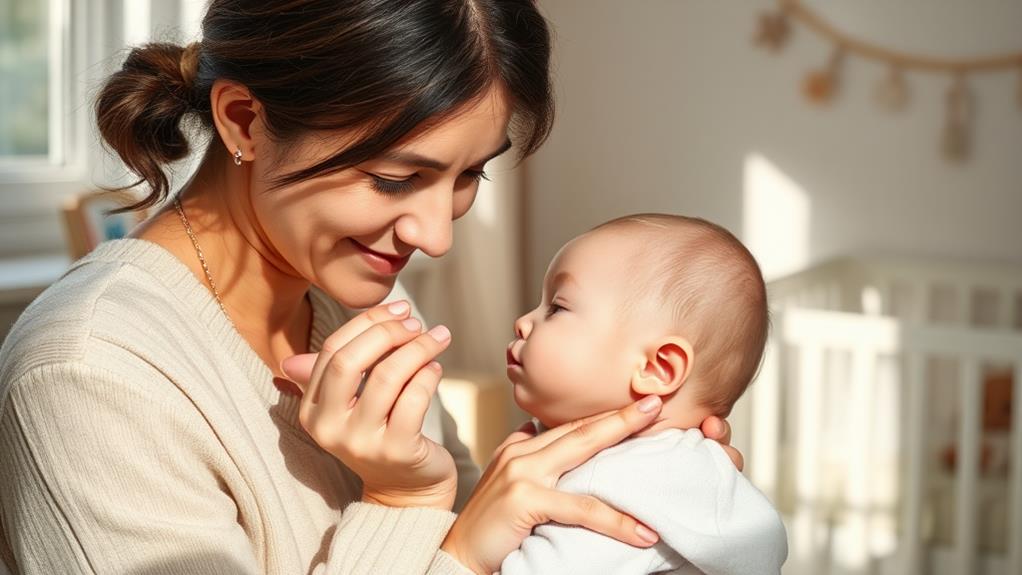
While home remedies can often be effective for treating infant acne, there are times when it's important to consult a healthcare professional. If your baby's acne seems severe or doesn't improve after a couple of weeks, it's wise to seek advice. Persistent acne might indicate a different skin condition that requires specialized treatment.
Additionally, if you notice any signs of discomfort, such as redness, swelling, or pus-filled bumps, don't hesitate to reach out to a pediatrician. These could be signs of infection, which may need prompt attention.
It's also essential to consult a doctor if your baby develops a rash or other unusual symptoms alongside the acne, as these could point to an allergic reaction or another skin issue.
Lastly, if you're feeling overwhelmed or unsure about your baby's condition, trust your instincts and ask for help. Your peace of mind is crucial, and a healthcare professional can provide reassurance and guidance.
Prevention Tips for Parents
Preventing infant acne can often be achieved with a few simple practices.
First, keep your baby's face clean. Use a gentle, unscented cleanser to wash their face daily. This helps remove excess oil and dirt that can clog pores. Avoid scrubbing too hard; a soft touch is best.
When it comes to clothing, choose breathable fabrics for your baby. Tight clothing can trap heat and moisture, contributing to breakouts.
Next, be mindful of any products you're using. Avoid lotions and oils that may contain heavy ingredients, as these can irritate your baby's delicate skin.
If you're breastfeeding, consider your own diet too; some foods might affect your baby's skin.
Lastly, try to keep your baby's hands away from their face. Babies love to explore, but touching their faces can transfer oils and bacteria, leading to potential acne.
Regularly trim their nails to minimize skin contact.
Myths About Infant Acne
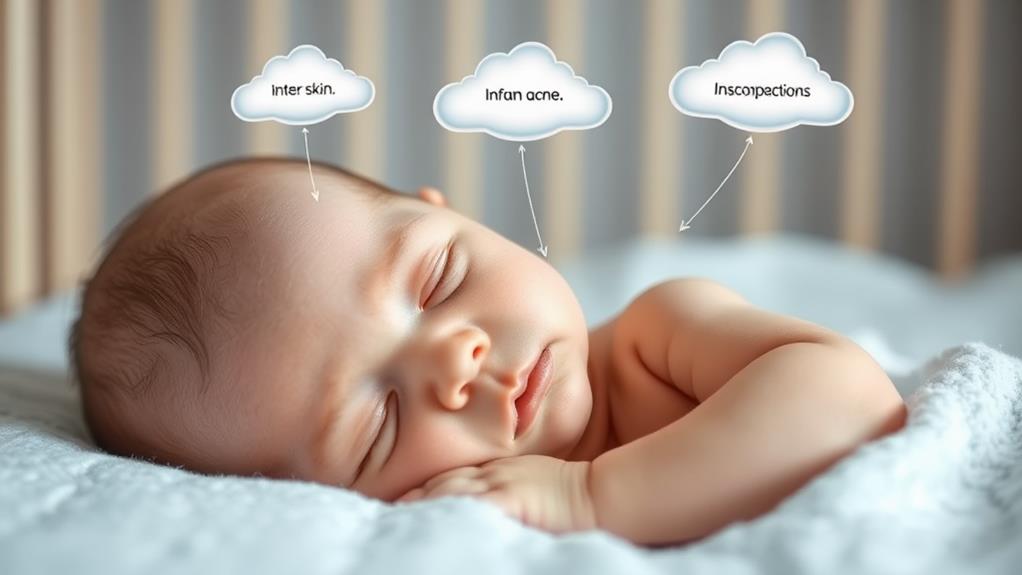
When it comes to infant acne, misconceptions can lead to unnecessary worry for parents. One common myth is that infant acne is caused by poor hygiene. In reality, washing your baby's face excessively can irritate the skin, making the condition worse.
Another myth suggests that infant acne indicates an allergy or a serious health issue. Thankfully, this isn't true; infant acne is usually harmless and self-limiting.
You might also hear that certain foods in your diet can trigger acne in breastfed babies. While a balanced diet is essential, there's no evidence that specific foods cause infant acne.
Some parents worry that acne will leave permanent scars on their little ones. Fortunately, most infants outgrow the condition without any lasting effects.
Lastly, many think that only older kids or teenagers can get acne, but that's not the case. Infant acne can appear in newborns as early as two weeks old.

